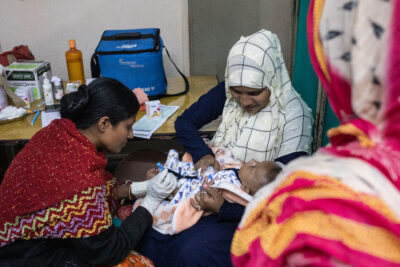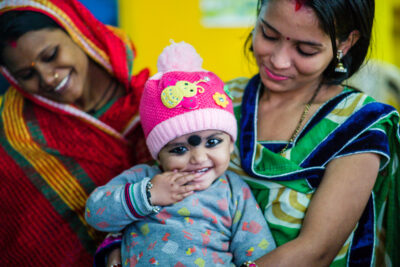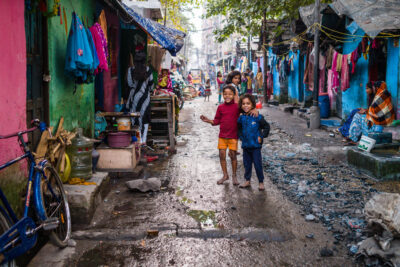At Calcutta Kids, our mission is to provide essential services that enable adolescent girls, women, and children in Kolkata’s slums to thrive.

What We Do
Science shows that there is a window of opportunity from conception through the first 1000 days of life in which getting the right care and nutrition can prevent irreversible damage to a child’s long-term health and development. Since our inception in 2005, Calcutta Kids has been committed to meeting this need.
At any given time, our programs serve about 600 mothers, 600 young children, 70 pregnant women, and 40 adolescent girls. Over the years, we have provided services to thousands of families.
Our services
We provide:
- Prenatal and postpartum health care
- Labor and delivery services
- Neonatal and pediatric health care
- Adolescent health services
- Growth monitoring and promotion
- Nutrition assistance
- Health education
- Social and emotional support
These services — which our community health workers and medical staff provide at our local community center and clinic and in the homes of the women, children, and adolescent girls we serve — comprise our maternal health, child health, and adolescent girls programs. Learn more about our programs.
To ensure that our beneficiaries have all their needs met, we partner with the local district hospital and other community organizations. Learn more about our partners.
Our objectives
-
Maternal Health Program
Reduce maternal morbidity and mortality
India has the highest number of women who die from childbirth in the world. -
Child Health Program
Reduce child morbidity and mortality
In India, more than 2 million children under 5 years old die each year of preventable causes. Malnutrition is responsible for more than half of these deaths.Improve birth weights
More than 1 in 4 babies in India is born with a low birth weight. Low birth weight is a major cause of death among newborns.Ensure that children from birth to 3 years old grow normally
In India, 43% of children are underweight and 48% of children are stunted. -
Adolescent Girls Program
Break the intergenerational cycle of anemia and malnutrition
Nearly half of all adolescent girls ages 15–19 in India are underweight, with a body mass index of less than 18.5.Delay the age of marriage
In India, more than half of all marriages include girls younger than 18 years old.Prepare young women to navigate marriage and motherhood
Many young women enter marriage with no understanding of sex, how pregnancy occurs, or what to expect during pregnancy and motherhood.Empower adolescent girls to advocate for themselves and their peers
Even if adolescent girls have hopes for their future beyond marriage and motherhood, they don’t know how to turn those dreams into reality.
The community we serve
Calcutta Kids serves adolescent girls, women, and children in Fakir Bagan, a transient slum community on the outskirts of Kolkata, India. (The city used to be known as Calcutta but has recently returned to its pre-colonial name, Kolkata.)
In Fakir Bagan, maternal morbidity and mortality, child morbidity and mortality, low birth weight, and abnormal growth are unacceptably high.
In 2005, we surveyed women in Fakir Bagan who had been pregnant within the past 3 years, and we learned that:
- 1 in 5 had their child die
- 1 in 7 had not received any prenatal care
- 1 in 3 had not received the most common pregnancy nutritional supplements
Because Fakir Bagan is an unauthorized settlement, its residents are vulnerable to displacement and ineligible for many government-provided services. Health services at private clinics tend to be unaffordable.
Conditions in Fakir Bagan — including poor sanitation and overcrowding — and a lack of education compound the health problems of community members.
In addition, women and adolescent girls in Fakir Bagan have no formal opportunities to learn even basic information about general, reproductive, and sexual health. As a result, they struggle to achieve health and well-being for themselves and their families.
Our programs grew out of the clear and compelling need for improved access to health care, health education, and nutrition assistance in Fakir Bagan.





